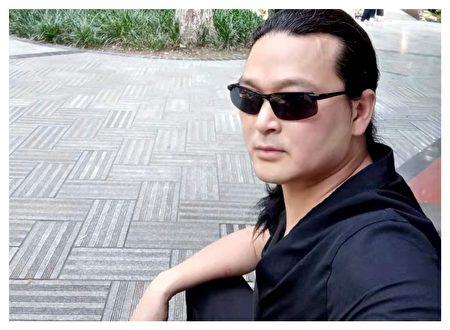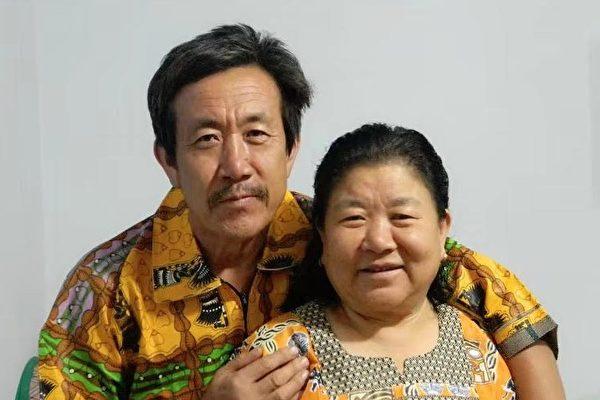He was just 24 when he returned to China. He had heard of the human rights violations there, and he believed that not getting involved in politics and religion would get him a free pass. But, his world turned upside down two years later.
Zhu Shuang, a Chengdu City native, was imprisoned in a mental hospital for 40 days, where he experienced electroshocks and physical abuse, and was given unknown drugs. Meanwhile, his pregnant wife was forced to have an abortion.
He managed to leave the mental hospital and now pursues his studies at York University in Toronto, Canada.
Police Break-In
While in China, the pandemic and lockdown of residential communities intruded on his personal dignity. He was blocked from his social media account due to posting online complaints.On Dec. 21, 2020, he received a call demanding that he report to the police station.
Zhu said to the Chinese language edition of The Epoch Times, “My first hunch was that it’s a prank call. He wouldn’t even give me his name, and finally he said his last name was Zhang,” and he was a police officer from the neighboring district of Qingbaijiang.
Zhu was busy preparing for the graduate school entrance exam he would sit on Dec. 27, so he just hung up after telling Zhang not to bother him.
On Dec. 22, Zhang called him again, saying that he was accused of “picking quarrels and provoking trouble,” and posting flyers.
“I told him I didn’t do it, didn’t have time to go to his place, and told him not to harass me,” Zhu said.
On the morning of Dec. 23, around 12 police, with arms and shields, broke into his apartment. Zhu was stunned—his face was hit with a shield, his glasses were knocked off, the world turned dark, and he felt like he had been hit by a car—all of which happened in front of his wife who was four months pregnant.
Screams filled the air.
Zhu was quickly pinned to the ground, and at that moment, his mind went blank.
He remembered being beaten and told not to resist, and he finally managed to control his instinctive resistance after the boots kicked his ribs and stomach.
When his face was pressed against the wall he came to his senses. He asked them to show an arrest warrant and subpoena. “You are trespassing,” he said. But the police didn’t show any documents.
Zhu continued, “It’s an illegal arrest without an arrest warrant; you deliberately broke the law, it’s an abuse of power; I will definitely appeal to the government.”
An officer’s hands pressed around his throat felt like an iron collar. Not until his pleas turned weak was the officer ordered to relax his grip a little.
Zhu was then dragged into a police car. At the station, he was asked his whereabouts on Dec. 21, when he was in Qingbaijiang shopping for tiles to remodel his newlywed home.
Police officer Zhang told him to admit that he posted a flyer and said that if he cooperated, his case would be a minor security issue with a small fine and detention; if not, it could become the crimes of “picking quarrels and provoking trouble,” and a sentence of up to three years in prison.
Zhu refused to admit to something he did not do, instead, he insisted that he’d reveal the incident to the media to win justice.
His response only brought him further maltreatment.
Psychiatric Mistreatment
The hospital security staff locked Zhu in a very small cargo container labeled with “nucleic acid testing.” Zhu was completely isolated from the hospital.At the same time, Zhu’s mother was forced to sign a paper stating that his admission to the mental hospital was “voluntary.” His mother was told that refusing to sign the paper meant Zhu would be taken to the police station, where “he’s subject to torture and there’ll be no guarantee he’ll survive,” the officer said.
In the interview on March 8, Zhu told The Epoch Times that this incident shows how the regime labels someone with mental illness—without any evidence—in its persecution campaign.
He said, “The police claimed that I had threatened social security; but when I was arrested, I was standing at the door of my own home, with a Huawei Mate10 mobile phone in my hands. How did I impose danger to society?”
Two strong male nurses moved Zhu to the acute psychiatric area of the hospital. On the way, he saw the numb faces of the real patients—some were drooling, moving slowly with their bodies hunched and feet dragging on the ground, and their eyes were lifeless; some were sitting idle on chairs, with military coats full of holes and paying no attention to the surroundings; some excitedly rushed to Zhu and asked how he got in. All of them wore the same patient pants, which Zhu later realized were to prevent patients from escaping.
At this time, he saw a man with long hair standing at the door of ward number 2. His clothes were neat and clean, and his eyes were clear. Although he looked haggard, he was definitely not defeated. In a prayer-like gesture, he smiled at Zhu. In those few seconds, Zhu was impressed. This was the first time he saw Si Yi.
Given Unnecessary Drugs
In the early evening, a nurse came with a small vial of medicine.Zhu questioned who prescribed the medicine since he had not seen a doctor.
The nurse said that she did not know how the doctor diagnosed him but he had to take the medicine.
He refused. A number of nurses came in and forced the injection.
Zhu said that to this day, he still has no idea what was injected into his body.
He said, “In the morning, it was all quieted down, and I yelled, ‘I need to pee,’ but for hours or more than 10 hours, no one came.”
Finally, Zhu had no choice but to urinate while tied to the bed.
He said, “It’s humiliating … something I would never want to experience again in my life, that’s not something human beings should experience.”
Hours later, a male nurse came and was angry to find that Zhu had wet the bed. In anger, he tied Zhu’s hands tightly behind his back and left. Zhu was left in the same position until the next morning. His shoulders were swollen so badly that he could not lift his arms above his shoulders for at least a week.
In order to keep from breaking down mentally, he tried very hard to hypnotize himself and meditate.
He closed his eyes and imagined that he was lying on the prairie in Queenstown, south of Christchurch, New Zealand, with blue lake water at his feet and misty lawns on his back … he prayed to God with the most sincere heart that it was all just a nightmare. He started to cry as quietly as he could.
A doctor finally showed up the next day. Zhu kept calm and told her that there was a mistake and that he was not sick. She said to him that only cooperation could prove that he was not sick.
On the third day, Zhu was transferred to a small room, where he learned that someone had died on the restraint bed less than a month ago.
On the same day, Zhu finally had his first meal in three days—rice and boiled cabbage; he was so hungry that he ate three bowls of rice.
He tried yoga and meditation to maintain his sanity and to help heal his wounded shoulders.
He was then moved to a large ward where other normal people tried to distinguish the normal ones from the real patients. They helped each other to avoid being harassed by mentally ill patients. He said, “Of course I don’t know if those mental patients were sick before or after they were in the hospital.”

A Failed Escape Attempt
Si Yi was sent to the hospital because he addressed the unfair compensation of a forced demolition. He had been there for four months, but kept his spirit up. He carefully analyzed Zhu’s situation and told him of a way to escape—hopefully Zhu would be able to come back and rescue him.Zhu totally collapsed on the day he was told that his wife had to undergo an abortion because of Zhang’s threats and intimidation.
More than a dozen unknown drugs were forced on him every day, the drugs made him so weak that he could barely move.
The escape plan ended before it even started; someone reported their plan and was rewarded with biweekly exercise.
Both Zhu and Si were tied on a bed for three days and nights, and had no choice but to urinate and defecate in their pants. A nurse even poured an AIDS patient’s urine onto Zhu’s genitals.
Zhu was forced to take more pills and have more injections.
Every morning there was a routine session of electroshock.
He said the pain was all he could sense. His mind was blank. “It felt like someone sawed my head open while I was alive, and then hit into my brain with a hammer. I don’t want to ever remember that moment,” Zhu said.
He was given the electroshock torture from the day he was tied to the restraining bed; the shocks were given for 30 minutes to two hours, depending on his behavior the day before. He said, “I really can’t remember how long I was shocked.”
After the electrical torture, he would unknowingly drool, and sit vacantly in the hallway. Any outside sound or light would frighten him, “My heart was in my mouth,” he said, and this also happened when he was safely in Toronto in September 2021.
At first, he was shocked once a day. After a week, it was once a week. Every Monday, everyone queued for the treatment. “You must go to the electrical treatment yourself; if you’re escorted by the nurse that means a longer shock time,” he said.
The torture at the mental hospital turned a cheerful, academically successful young adult into a completely different person.
During that time, Zhu’s bones felt itchy every day. He would scratch so hard his skin would break but nothing stopped the itching. He could only lie on the ground, with feces and urine in his pants, and wait for the itching to slowly dissipate.
Zhu said: “There was also a despair—something I have never experienced in my life—no words can describe it. It is a feeling of numbness and coldness.”
Zhu took the initiative to ask for antidepressants for the first time in his life.
During that time, Si Yi, like a caring family member, forced him to walk around the room together in circles every day—cheering him up.
Zhu said, “He made me tell him all the happy things from the past, what it’s like in the West. He was like my father and my big brother. He would pull me up from the bed, force me to take a shower, and change, guide me in Buddhism, and ask me to meditate with him. He told me that the wicked must be punished, and it was only a matter of time.”
Zhu’s parents used the entire 170,000 yuan ($26,670) he had saved for remodeling his home to get him out of the hospital. To this date, he still has no idea how much his parents spent to save him.
On Feb. 3, 2021, Zhu was finally released from the hospital accompanied by his wife and mother. The moment he saw the sky again, each step felt like stepping on cotton.
The photophobia (sensitivity to light) lasted for more than a month before he could be in the sun without wearing sunglasses; but the post-traumatic stress disorder continues to this day.
After 40 days of receiving unknown drugs, Zhu’s body was completely destroyed. His body fat used to be 19 percent; by the time he was released, it was 30 percent, and he had gained 40 lb. He said, “Even my wife barely recognized me. Rice and cabbage can cause someone to gain 40 pounds; of course, thanks to the hormones they administered for treating schizophrenia.”
Around Feb. 24, 2022, Zhu received the news that Si Yi had passed away.
Zhu said, “No one deserves that.”



